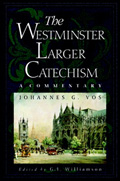
G. I. Williamson, Ed.
Reviewed by: Larry Wilson
The Westminster Larger Catechism: A Commentary, by Johannes G. Vos, edited by G. I. Williamson. Published by P&R, 2002. Paperback, 639 pages, list price $19.99. Reviewed by Larry Wilson.
If you don't buy another book this year, make sure you get and use The Westminster Larger Catechism: A Commentary, by J. G. Vos!
Johannes G. Vos (1903-1983), after pastoring two RPCNA congregations and serving as a missionary in Manchuria, was a professor at Geneva College for many years. He also edited a quarterly magazine of Bible and doctrinal instruction, Blue Banner Faith and Life, for 29 years. He wrote most of the articles himself, using his God-given gift for digesting complex material and explaining it simply and clearly.
G. I. Williamson has performed a tremendous service by combing through old issues of Blue Banner Faith and Life, where this material first appeared as serial articles, and collecting it into this volume. Don't let the word commentary in the title scare you away. Prof. Vos wrote with great simplicity and clarity. His pastoral heart shines through on every page. He comments on the Larger Catechism by first listing Scripture proof texts and summarizing their import for the point at hand. Then he gives a series of brief questions and answers, explaining various aspects and ramifications of the question he is discussing.
An excellent article by W. Robert Godfrey, "An Introduction to the Westminster Larger Catechism," introduces this volume. In it Dr. Godfrey explains the continuing value of the Larger Catechism for the church today. The Larger Catechism provides outstanding summaries of doctrine, perhaps even improving on the Confession of Faith in certain places. It provides an especially full discussion of the Ten Commandments. Whereas the Shorter Catechism focuses on individual believers, the Larger Catechism focuses more on the Christian community and develops a full-orbed doctrine of the church (which is much needed in our day).
Let me give one example of Prof. Vos's writing. In his discussion of the fifth commandment he comments:
What is the effect of the sin of envy on the envious person? This sin, besides being a grave offense against the law of God, inevitably has a spiritually and psychologically destructive effect upon the person who is guilty of it. The envious person is himself the victim of his own sin, and his personality becomes corroded by envy until he becomes either sour or brittle. Such a person will be suspicious, resentful, easily offended, difficult to deal with, and a "problem" to his friends and associates. The Scripture calls envy "the rottenness of the bones" (Prov. 14:30). The person who tolerates this sin in his life is playing with an acid which, if not checked, will eat away at his personality until his disposition is ruined and he is wholly dominated by envy. Only the almighty power of God can save a person from such a pitiable state of spiritual bondage.
This book is a great resource to use when studying various subjects. One thing that makes it so useful is its good Scripture index. Another good tool is a thorough outline of the Catechism prepared by Jeffrey K. Boer.
My only real quibble with this book is that it is published in paperback form. While this makes it more affordable, surely such an important resource deserves to be published as a durable, attractive hardback. One can hope that this deficiency will be remedied in the future. In the mean time, I hope this one shortcoming won't discourage people from purchasing and using the book. Very highly recommended!
February 01, 2026
January 25, 2026
January 18, 2026
January 11, 2026
Texts that Transform: Church and Ministry
January 04, 2026
December 28, 2025
December 21, 2025
© 2026 The Orthodox Presbyterian Church